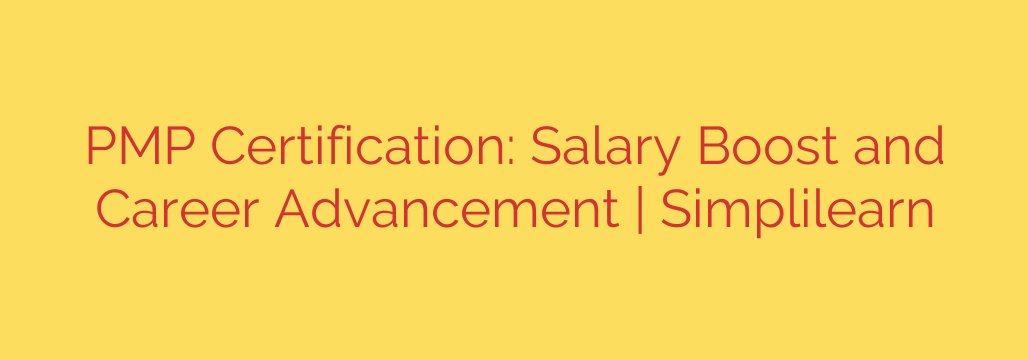
Boost Your Salary with a PMP Certification: Your Guide to Career Advancement
In today’s competitive job market, professionals are constantly seeking ways to stand out, validate their skills, and climb the career ladder. For those in the world of project management, one credential consistently proves its value time and time again: the Project Management Professional (PMP) certification. More than just a few letters after your name, the PMP is a powerful tool that can unlock significant salary increases and open doors to new career opportunities.
If you’re a project manager wondering how to take your career to the next level, understanding the tangible benefits of PMP certification is the first step. This isn’t just about learning new theories; it’s about making a strategic investment in your professional future.
The PMP Salary Boost: A Quantifiable Return on Investment
One of the most compelling reasons to earn your PMP certification is the direct impact it can have on your earning potential. According to the Project Management Institute’s (PMI) “Earning Power” salary survey, the results are clear and consistent.
Professionals holding a PMP certification report significantly higher median salaries than their non-certified peers. Globally, PMP-certified project managers earn, on average, 16% more than those without the certification. In some countries and industries, that gap can be even wider. This salary premium exists because employers recognize the value of the PMP. It signals that you possess a standardized, globally recognized skill set and a serious commitment to the project management profession.
By investing in the PMP, you are positioning yourself as a high-value expert, and companies are willing to pay a premium for that proven expertise.
More Than Money: How PMP Fuels Your Career Growth
While a higher salary is a major advantage, the career benefits of PMP certification extend far beyond your paycheck. It acts as a powerful catalyst for long-term professional development.
The Global Gold Standard: The PMP is the most recognized and respected project management certification in the world. It acts as a universal language, demonstrating your capabilities to employers and colleagues across industries and continents. This global recognition makes you a more competitive candidate, whether you’re looking for a job at home or abroad.
Opens Doors to Better Opportunities: Many organizations, especially large enterprises, list the PMP as a preferred or even required qualification for senior project management roles. Earning your certification can get your resume past automated filters and into the hands of hiring managers for high-impact, high-visibility positions that might otherwise be out of reach.
Enhances Your Project Management Skills: The process of studying for the PMP exam is an education in itself. You will gain a deep understanding of best practices, processes, and methodologies outlined in the PMBOK® Guide. This structured knowledge helps you manage projects more efficiently, mitigate risks more effectively, and deliver better results—making you a more competent and confident leader.
Demonstrates Professional Commitment: Pursuing and achieving PMP certification shows a clear dedication to your craft. It signals to employers that you are invested in your personal and professional growth and are committed to upholding high standards of practice.
Is the PMP Certification Right for You?
The PMP is not an entry-level certification. It is designed for experienced project managers who want to formalize and validate their existing skills. To be eligible for the exam, you must meet specific requirements set by the PMI, which typically include:
- A four-year degree, along with at least 36 months of experience leading projects.
- OR a high school diploma or an associate’s degree, along with at least 60 months of experience leading projects.
- In either case, you must also have 35 hours of project management education or a CAPM® certification.
If you meet these prerequisites and are looking to solidify your expertise and advance your career, the PMP is an excellent choice.
Your Action Plan: Steps to Becoming PMP Certified
Ready to take the next step? Here is a simplified path to earning your certification:
- Verify Your Eligibility: First, confirm that you meet the education and experience requirements outlined on the official PMI website.
- Complete the 35 Hours of Training: Enroll in a recognized project management course or workshop to fulfill the educational prerequisite. This training is also crucial for preparing you for the exam’s content.
- Submit Your Application: Create an account on the PMI website and complete the application process, detailing your experience and education.
- Prepare and Study: Once your application is approved, it’s time to study. Use a combination of study guides, practice exams, and training materials to master the concepts.
- Schedule and Pass the Exam: With thorough preparation, you can confidently schedule your exam at a testing center or online and earn your PMP credential.
The Verdict: A Strategic Investment in Your Future
Earning a PMP certification requires a significant investment of time, effort, and money. However, the evidence overwhelmingly shows that the return on that investment is substantial. From a significant salary increase to enhanced job prospects and global recognition, the PMP is a proven way to accelerate your career. It solidifies your standing as a skilled professional and equips you with the knowledge and credibility to lead complex projects successfully.
Source: https://www.simplilearn.com/top-benefits-of-pmp-certification-article








